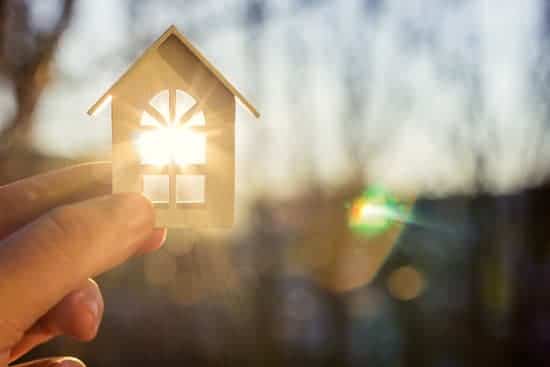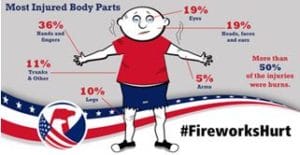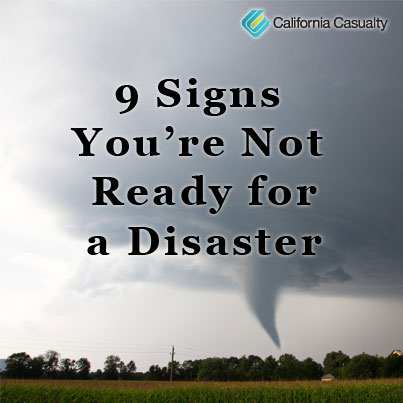
by California Casualty | Homeowners Insurance Info |
Spring is here. As we look forward to longer, warmer days, it’s a good time to look around your home or apartment and identify the elements that might pose a danger to you or others. You might also eliminate conditions that could cause unnecessary damage.
Here are five simple things that can make your home or apartment safer.
1. Prevent break-ins.
Did you know break-ins increase in the spring and summer? The Justice Department says a home in the U.S. is burglarized every 20 seconds. Many of these are crimes of opportunity from thieves looking for an easy target. Simply locking doors and windows, not leaving garage doors open and installing extra lighting and a security system can reduce the risk. Trimming back bushes from around the home, having a dog and joining a neighborhood watch group are also good ways to deter a burglar.
2. Fire-proof your home.
Many of us may not know that fires burn hotter and faster than in the past. New tests show the open floor plans of modern homes, synthetic furniture and tons of electronics can cause a spark or a flame to flash into a major blaze in just three to five minutes. It’s important that we eliminate clutter, install smoke detectors on all levels of the home and in all bedrooms, have fire extinguishers available, and have an escape plan. It’s also essential to create defensible space around your home in case of a wildfire. Remember, too, that smoking materials are the leading cause of fire deaths.
3. Eliminate trips and falls.
While you can’t prevent all of them, you can make certain that stairs are in good repair with firm handrails, toys, newspapers and other clutter are picked up, rugs have a non-skid backing and bathrooms and showers have safety handles and no-slip bathmats. Adequate lighting inside and outside also helps. Not only will these actions protect your family, but they help prevent you from being sued if someone hurt themselves at your home or apartment.
4. Prepare for natural disasters.
This is the beginning of storm season. Do you have a safe area in case there is a tornado or earthquake? Do you know your risk for flood, fire or weather events? Now is the time to make certain your home is as disaster proof as possible, that you have an evacuation and communications plan, and prepare an emergency kit with extra food, water, medicines, etc.
5. Check appliances, pipes and wires.
Water from broken pipes, loose fittings and clogged drains can cause serious damage to your home. Inspect the backs of refrigerators, washers and other water sources for cracked pipes or rusted connectors. Frayed wires and clogged vents can cause fires, as can fireplaces and heaters that haven’t been cleaned and checked.
No matter how well you plan, you need home or renters insurance to protect your most valuable asset and your possessions. Homeowners and renters insurance also provide temporary housing and additional living costs while your home is repaired, as well as liability protection in case you get sued. Don’t forget that earthquakes and floods are not covered under your homeowner or renters insurance. You need separate policies for those.
by California Casualty | Safety |
The Fourth of July rings in a day of patriotism and pride. There will be barbeques and picnics, parades and festivals followed by fabulous fireworks displays in towns and cities across the nation.
If you are lucky enough to live in or be in Seattle or Minneapolis, you will be treated to the two best Fourth of July celebrations in the nation. WalletHub factored in 16 metrics – including the duration of the fireworks display, average gas prices and weather forecasts – to pick their 10 best Independence Day celebrations. The rest of the top ten were: New Orleans; Washington, D.C.; Portland, Oregon; St. Louis; San Diego; Milwaukee; San Francisco and Orlando.
Whether it’s on the list of or not, hopefully your community will be holding a celebration too.
If you are planning to set off fireworks in a nearby park or near your home, you are urged to be very careful or skip that part of the celebration. It would be a shame if one of your children was injured or a neighbor’s home was burned by a bottle rocket or sparkler.

According to the Consumer Product Safety Commission, the majority of fireworks injuries in 2014 occurred in the 30 days surrounding the July 4th holiday, resulting in 10,500 people treated in U.S. hospital emergency rooms. Pyrotechnics also caused an estimated 18,000 fires with 11 deaths. Children five to nine years of age had the highest estimated rate of emergency department injuries from fireworks.
The U.S. Consumer Product Safety Commission warns that even sparklers burn at nearly 2,000 degrees, hot enough to melt wood, plastics and some metals, and inflict terrible burns on mostly young people. Most of the injuries were to the hands and fingers, head, face and the eyes; caused mainly from firecrackers, bottle rockets and sparklers. The Alliance to Stop Consumer Fireworks, coordinated by the National Fire Protection Association (NFPA), is calling for an end of the use of personal fireworks. Their goal is to educate parents and caretakers before more people get hurt or burned. They also urge people to attend professional community displays instead of using them at home.
Realizing fireworks are still used by families; the Consumer Product Safety Commission has developed these essential safety tips:
- Never allow young children to play with or ignite fireworks
- Avoid buying fireworks that are packaged in brown paper because this is often a sign that they were made for professional displays and could pose a danger to consumers
- Always have an adult supervise fireworks activities.
- Never place any part of your body directly over a fireworks device when lighting the fuse and back up a safe distance immediately after lighting fireworks
- Don’t try to re-light or pick up fireworks that have not ignited fully
- Never point or throw fireworks at another person
- Always keep a bucket of water or a garden hose handy in case of fire or other mishap
- Only light fireworks one at a time, then move back quickly
- Never carry fireworks in a pocket or shoot them off in metal or glass containers
- After fireworks complete their burning, douse the spent device with plenty of water from a bucket or hose before discarding it to prevent a trash fire
- Make sure fireworks are legal in your area before buying or using them
Remember, while they may be pretty to watch, the damage from personal use of fireworks is more than just statistics or numbers; they are real victims – sons, daughters, parents and grandparents. Think before someone in your family goes to the emergency room.
by California Casualty | Homeowners Insurance Info |
Are you prepared for hurricanes, tornadoes and fires? If your home was threatened would you know what to do? This is the season and at the very least, all of us should:
- Prepare an emergency kit
- Have a family evacuation and communications plan
- Stay Informed via the Internet, radio, TV or with a NOAA Weather Radio
- Keep your car’s gas tank full in case of evacuation
- Stay away until law enforcement or other agencies say it’s safe to return
- Know what your home insurance policy does and does not cover
- Complete a home inventory
Unfortunately, no matter how prepared we all are disasters happen. It’s important that you follow these important steps to avoid identity theft or fraud if your home is damaged or destroyed:
- Contact your insurance company as soon as possible
- Secure the property from further damage or theft
- Contact creditors, banks, or appropriate agencies to report important documents (social security cards, tax returns, birth certificates), credit cards or banking papers that might have been scattered or lost in the disaster
- Check your credit report to make sure nobody is using your personal information
- Beware of “fly-by-night” work crews and contractors
- Be skeptical of contractors encouraging you to spend large sums on temporary repairs
- Attain recommendations and check the Better Business Bureau before hiring any potential contractor
- Review the contract thoroughly and get written estimates
- Avoid dealing with contractors that request money up front
- Never pay a home contractor in cash – only pay by credit card or personal check
- Do not sign over your insurance settlement check
- Don’t be pressured or fall for “one-day-only” offers
- Be cautious if approached by housing inspectors claiming to represent FEMA or the SBA
- Keep or document receipts and other expenses if you are evacuated or forced to find another place to live because of damage to your home or apartment
by California Casualty | Homeowners Insurance Info |

Why should I worry, there’s never been a disaster or emergency in my area before? If that’s your reaction to emergency preparation, you’re setting your family up for disaster. Here are nine other signs you probably aren’t ready for the unexpected:
- You have no property insurance or the “bare minimum” because your house is paid off.
- You couldn’t be bothered signing up for those annoying cell phone emergency alerts.
- What’s a weather alert radio?
- You only know one way in and out of your neighborhood.
- When someone mentions geographic land features, you think they are talking about the mound left in the front yard where the tree was removed last year.
- When you hear there is a tornado or severe thunderstorm watch, you actually go out to watch for them.
- You think a bottle of water and a fanny pack are all you need if you are evacuated.
- Having a home inventory means knowing how much toilet paper and milk you have.
- Heck, we’ve been waiting for that big storm so we can get a new roof (we already have five leaks, what’s one more).
Seriously, disaster preparation is not a laughing matter; just ask anyone who survived the fury of Hurricane Sandy, the horrors after Hurricane Katrina, or dug through the ashes of their homes in the recent disastrous West Coast fires. September is National Preparedness Month when emergency experts are asking everyone to know their risks, develop a plan, prepare an emergency supply kit and make a home inventory. In the next few days and weeks we’ll share details on things you need to do before a disaster strikes. In the meantime, visit www.ready.gov for more information on preparing for an emergency, before it’s too late.
by California Casualty | Auto Insurance Info |
*Updated June 2018
The dog days of summer don’t just leave you overheated and exhausted, they take a toll on your vehicle.
Did you know?
- Summer heat drains your battery faster than the cold of winter. Excessive heat and overcharging are the two primary causes of premature battery failure
- Exposure to prolonged sunshine can fade your car’s paint
- Extremely hot days tax the air conditioning and cooling system of your vehicle
- Lubricating oil can break down under extreme heat conditions
The Car Care Council recommends these routine maintenance practices to keep your vehicle operating under hot summer conditions:
- Periodically check and test batteries for proper charging
- Make sure your cooling system has the proper anti-freeze/coolant and all belts, hoses and the water pump are properly working (never open a hot radiator cap; the liquid inside is a scalding 200 degrees or hotter)
- Check the air conditioning system for leaks and proper coolant
- Make sure the viscosity of your motor oil will stand up to hot weather days (10W-30 or 10W-40)
If you are planning to hit the road for a long trip you should also:
- Check the tires for tread and proper inflation
- Make sure the spare tire is inflated and there is a jack and tire changing tools
- Test your windshield wipers and change them if they are streaking
Consumer Reports advises that you should also have a basic safety kit that consists of:
- Cell phone and spare battery
- First aid kit
- Fire extinguisher
- Warning light or reflective triangles
- Tire gauge
- Jumper cables
- Foam sealant for flat tires
Things you should know how to do in case you have a roadside emergency:
You also need the proper insurance to protect your vehicle and those riding with you. Call a California Casualty advisor today for a policy review and comparison, 1.800.800.9410 or visit www.calcas.com.
Sources for this article:
https://www.carcare.org/2014/06/dream-vacation-or-nightmare-road-trip-pre-trip-vehicle-check-can-make-the-difference/
https://www.carcare.org/2014/06/four-symptoms-of-a-sick-cooling-system/
https://www.consumerreports.org/cro/2012/03/roadside-emergency-kit-what-to-carry-with-you/index.htm



